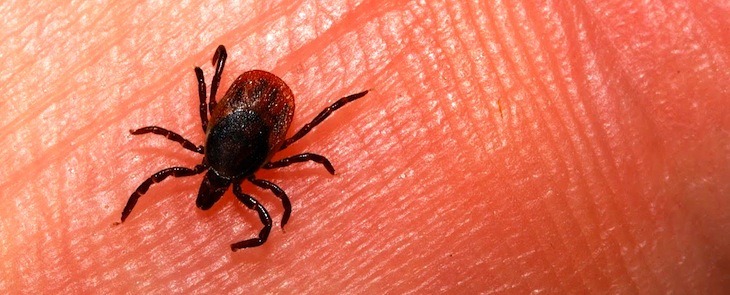Tick-borne illnesses increase around the state, West Nile virus returns
by August 31, 2017 1:14 pm 1,635 views

Tick-borne illnesses such as Ehrlichiosis and Rocky Mountain Spotted Fever are on the rise in Arkansas through the first eight months of this year. The Arkansas Department of Health has recorded 929 cases of tick-borne illnesses, with 770 of those being Spotted Fever. In 2016 there were 1,068 cases, which has nearly doubled since 2013.
Richard Taffner, epidemiologist for the state, said weather can play a role in the number of cases. The warm winter and mild summer weather has likely allowed more people to be outdoors where the tick population has grown.
Dr. David Vester, of MedExpress in Northwest Arkansas, told Talk Business & Politics, the number of cases of tick-bite illness diagnosed in its Arkansas clinics is up 43% over last year. In MedExpress clinics across 17 states the number of patient visits caused by ticks and Lyme disease is up 18% year-over-year. Vester said public awareness around tick-borne illnesses is also why there are more cases reported. He said in Arkansas there is very little risk of Lyme Disease compared to the Mid-Atlantic states. Taffner said there has just been two cases of Lyme Disease reported in Arkansas since 2012, and those were last year.
Vester said Rocky Mountain Spotted Fever is far more prevalent in Arkansas and while it’s not Lyme Disease it presents it own set of symptoms that make the afflicted very sick. He said most often those afflicted will present with fever, headache, muscle aches and joint pains similar to the flu. A red, bumpy rash will develop in a few days that typically starts on the arms and legs.
He said treatment for Spotted Fever and most tick bite symptoms include a regimen of antibiotics which are taken for up to four weeks. Vester said the earlier the antibiotics are given the better to prevent complications, especially in children. The state said one Arkansan has died from tick-borne illness this year. Vester said while the cases can be serious, as many as half of those who test positive for the illness in MedExpress Clinics have no symptoms.
He said summer and fall are when most people are at the most risk for tick-borne illness. Vester said it’s important for consumers to check themselves for ticks after they have been outdoors. He also said wearing protective clothing and using pesticides can help reduce the risk of tick bites. Vester reminds consumer to check their pets regularly because they can bring the ticks into the home. The bacterium of Rocky Mountain spotted fever is carried mostly by the American dog tick (Dermacentor variabilis) and the brown dog tick (Rhipicephalus sanguineus).
WEST NILE TURNS
Another concern for those outdoors is the presence of West Nile Virus in Arkansas. The Health Department and Centers for Disease Control are urging people to take steps to prevent infection. The first two cases of West Nile Virus this year were detected in Arkansas two weeks ago.
“People should be aware we have West Nile virus in our state and take action to protect themselves and their family from mosquito bites” said Dr. Susan Weinstein, state public health veterinarian.
West Nile virus is transmitted to people by infected mosquitos and in the U.S. most people are infected from June through September with that number typically peaking in late August. The state said there are many factors that impact the number of mosquitos that spread the virus, such as weather and human behavior.
Approximately 1 in 5 people who are infected with West Nile virus will develop symptoms such as fever, headache, body aches, joint pains, vomiting, diarrhea, and/or rash. Less than 1% will develop a serious neurologic illness such as encephalitis or meningitis (inflammation of the brain or surrounding tissues). About 10% of people who develop neurologic infection due to West Nile virus will die. People over 50 years of age, and those with certain medical conditions, such as cancer, diabetes, hypertension, kidney disease, and organ transplants, are at greater risk for serious illness.
There are no medications to treat or vaccines to prevent West Nile virus infection. People with milder illnesses typically recover on their own, although symptoms may last for several weeks. In more severe cases, patients often need to be hospitalized to receive supportive treatment, such as intravenous fluids, pain medication, and nursing care. Anyone who has concerning symptoms should contact a healthcare provider.
Weinstein said the best way to prevent West Nile virus disease, and a variety of other mosquito-borne diseases, is to avoid mosquito bites. Avoid mosquito bites with the following steps.
• Use insect repellants when you go outdoors. Repellents containing DEET, picaridin, IR3535, and some oil of lemon eucalyptus and para-menthane-diol products provide longer-lasting protection. Repellents should be used according to the label instructions. The current American Academy of Pediatrics (AAP) and CDC recommendation for children older than 2 months of age is to use 10% to 30% DEET.
• Wear long sleeves, long pants and socks when outdoors.
• Take extra care during peak mosquito biting hours. Take extra care to use repellent and protective clothing from dusk to dawn or consider avoiding outdoor activities during these times.
• Reduce the number of mosquitoes inside and outside your home by emptying standing water from containers such as flowerpots or buckets and refreshing stagnant water in pools and birdbaths often. Larvicides may be added to stagnant water that cannot be emptied.
